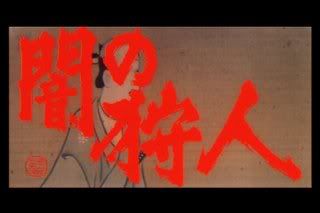
You can’t go wrong centering a your film on a one-eyed assassin. It helps when said assassin, Yataro Tanigawa, is played by someone like Yoshio Harada, who excels at looking both grizzled and dangerous (and not much else). Hunter in the Dark, a late 70s yakuza flick by Hideo Gosha, follows Tanigawa’s entrance into the service of Boss Gomyo Kiyoemon (Gosha’s main man Tatsuya Nakadai), a canny and tired crime lord who wants, above all, to retire someplace nice. Most viewers won’t be surprised to find out that this isn’t an easy goal for a yakuza boss to accomplish.
Like Goyokin and Tenchu! before it, Hunter in the Dark is a deeply cynical film, one in which the samurai idea of honour is largely felt only by its absence. In those earlier films, samurai clans are responsible for the evils that the main characters suffer; in Hunter in the Dark, the samurai (embodied in Samon Shimoguni, played by Sonny Chiba) are the villains, and the side of good, if it exists at all, can be found in the ranks of the yakuza.
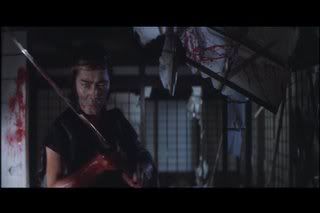
Seen alongside these two other films, one can trace Gosha’s increasing nihilism. Gosha seems incredibly skeptical about the entire idea behind the samurai, and also seems to point towards the degenerative powers of violence. Of course, this can lead to a bit of a mixed message, since Hunter in the Dark might be Gosha’s best action film, while it simultaneously sends a message that violence begets more violence, and eventually overcomes everything.
But I’m getting ahead of myself. As mentioned, Hunter in the Dark primarily follows Tanigawa, the one-eyed assassin, who also turns out to be an amnesiac. He comes into the employ of Gomyo, who uses him as a bodyguard--an important position, when one works exclusively in the underworld. Tanigawa and Gomyo both get caught up with Samon in a complex bit of political intrigue that involves Tanigawa’s mysterious past and lots and lots of violence.
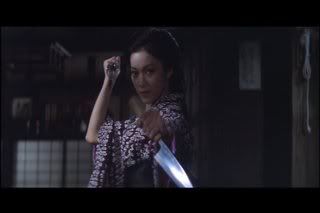
Hunter in the Dark sees Gosha begin to incorporate women more and more into the story. This is something that he continues throughout the rest of his films--Onimasa, his next film, features an actress in the leading role, and after that films like The Geisha and the Yakuza Wives are focused entirely on women. Here, while you do get one example of a loyal and loving woman, Oriwa (Ayumi Ishida), the majority are included for the purpose of a bath house knife fight. Not that I’m complaining.
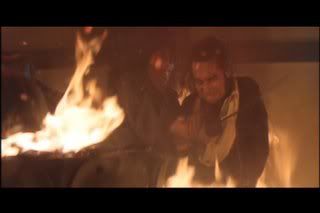
At the end of the day, the plot of Hunter in the Dark primarily serves to allow Gosha to film some of his best action sequences. This isn’t to say that there’s nothing to the plot (it’s substantial) or that the characters are unimportant (they aren’t). Nevertheless, the film is driven by action. Whether it’s the action of the narrative--including the political machinations, or the revenge schemes, or what have you--or the actual, physical action scenes, Hunter in the Dark remains an action movie. And the action found in it is great. The story allows Gosha to produce a what could be described as action set-pieces, like the bloody fight in the tea house, or the bath house knife-fight, or the battle in the blazing temple. All of them are thrilling, and Gosha is really able to go all out.
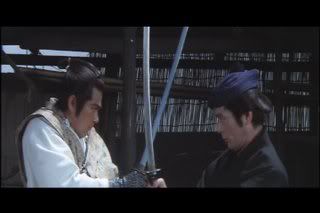
To the best of my knowledge, there’s currently no official Region 1 release of Hunter in the Dark. That means anyone interested in tracking down the film has to enter bootleg territory. That being said, if you can track it down, and you’re the type of person who would track it down, then I think you’re in for a rewarding experience. The weaknesses of the script (slightly convoluted plot, fairly weak characters) and the fairly pedestrian acting (Nakadai is wasted in his role) are more than compensated for by Gosha’s excellent filmmaking. Hunter in the Dark might not be a classic, but maybe it should be.










1 comment:
I wasn't sure about using the term nihilism. “Nihilism” is among the most overused word in film criticism (especially amateur film criticism)--most of the time, people use it as a smart-sounding synonym for “dark” or “gloomy,” and attach an absolute value to it. To say something is “nihilistic” is attach a certain degree of worth to a piece. So generally I'm against it, but I think it's accurate in this case.
Post a Comment